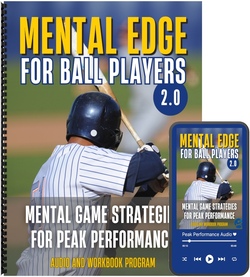Improving Your Mental Game in Baseball
When is extra batting practice not enough?
When is off day training not enough?
When is strength training not enough?
When is eating the right foods not enough?
When is additional fielding practice not enough?
When it comes to peak baseball performance, it is not enough to only focus on the physical aspects of the game.
Focusing on the physical game alone is one reason why baseball players suffer inconsistent performances.
Yes, baseball is a physical game. You must be physically present… You need to physically hold the bat, throw the ball, run the bases and field the ball.
If you want to consistently play your best, it is not enough to be physically present… You must be mentally present.
There is more to baseball than throwing, catching and hitting.
You need to be able to deal with the following mental factors:
- Slumps
- Making errors
- Throwing bad pitches
- Giving up home runs
- Blowing a lead late in the game
- Striking out with the bases loaded
- Getting picked off of first base
- Losing five games in a row
- Playing with a one run lead late in the game
- Being the underdog, etc.
If you pay no attention to developing a strong mental game, you will find it harder to have a strong physical game.
The mental game is extremely important for Atlanta Braves third baseman prospect Austin Riley.
Riley has learned a lot about the mental game, especially the mental game of hitting, during spring training from Atlanta great Chipper Jones.
Riley is 20-years old and is a top minor league prospect who is looking to eventually be a cornerstone at third base for the Braves for many years to come.
Riley evaluates his mental approach for each at-bat more so than the result of his plate appearance.
RILEY: “It’s been an honor to be around that type of player [like Chipper Jones] and pick his brain about the mental side of hitting and the importance of trying to get inside the pitcher’s head. I’m just really trying to progress with the mind game. Really, the next level is the game inside the game.”
The higher you climb in your sport, as Austin Riley noted, the more important your mental game becomes.
Getting to the next level requires improving your mental game as much as it does developing your technical skill set.
Not only does your mental game help get you to the next level; it will give you a decisive advantage over the competition at that level.
Improving Your Mental Game:
Adopt Riley’s approach to your mental game…
Assess your game and evaluate how your mental game influenced your performance.
After a game, mentally review your approach to each play:
- How did mental factors affect that at-bat?
- What was your mental approach heading into the batter’s box?
- What were you thinking about during the at-bat?
- Were you feeling relaxed or nervous?
- Were you confident?
- What were you thinking when you were down in the count had a swing and miss at a fastball down the middle?
Option 1: Evaluate your mental approach to figure out what has worked and what mindsets might hinder your performance.
Option 2: Request our one-page mental game assessment to identify areas of your mental game that can improve (just return this email).
Option 3: Contact us today to learn more about working one-on-one with myself or Dr. Megan, our new mental coach.
Related Sports Psychology Articles
- How Wilson Contreras Improved His Mental Game
- When Ball Players Ignore Their Mental Game
- Athletes Who Refuse To Improve Their Mental Game
*Subscribe to The Sports Psychology Podcast on iTunes
*Subscribe to The Sports Psychology Podcast on Spotify
Get The Mental Edge for Baseball and Softball
If you have trouble taking your practice game to competition and under perform in games, your mental game might be the culprit! Baseball and softball players contact me everyday wanting to know why they become scared, anxious, afraid to make mistakes, and lack trust in their skills during games…
You might have a ton of physical talent and perform great in practice, but if you can’t get the job done when it counts, something is missing and the problem is an inferior mental game–not talent or motivation.
We’ve spent the last six months developing a program to teach you how to improve your mental game in 8 easy-to-apply lessons–the same TOP lessons that I teach to baseball and softball players everyday in my one-on-one mental coaching program!


